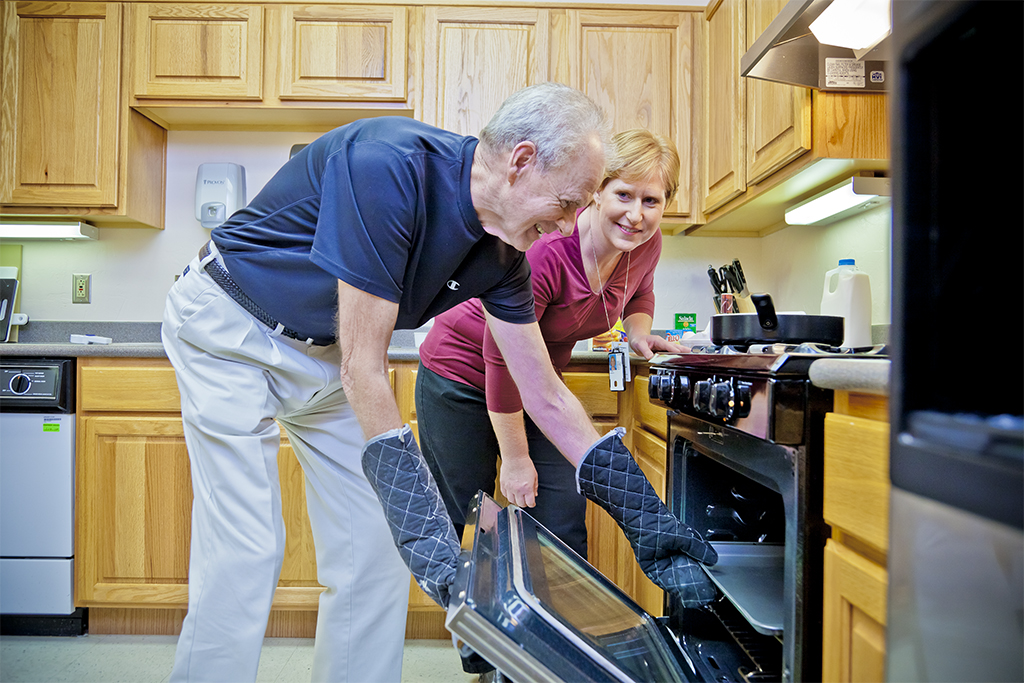
The Healthy Teaching Kitchen (HTK) program has added an experiential learning option to complement traditional nutrition counseling visits. HTK is offered at 119 VA sites and has a presence in 48 states within the U.S.
VA’s Nutrition Food Services (NFS) program provides various tools and educational resources to encourage and teach Veterans how to lead a healthier lifestyle. One of the educational resources that VHA is using to promote nutrition and wellness is the Healthy Teaching Kitchen (HTK) program.
Beginning in 2007, this innovative program added an experiential learning option to complement traditional nutrition counseling visits. HTK is offered at 119 VA sites and has a presence in 48 states within the U.S. The number of Veterans attending HTK has almost tripled over the last 5 years, reaching over 7000 Veterans, with ample opportunity to grow.
HTK is dedicated to improving Veterans’ skills and confidence to prepare healthy meals. The overall goal of HTK is to increase Veterans’ self-efficacy with regards to food selection and preparation in a home-like environment, and to develop and nurture healthy, life-long eating habits.
“This class is very helpful. I’m changing the way I eat and plan meals,” stated a Veteran HTK participant at the Cincinnati VA.
Lifelong health
Nearly all participants (95%) in the VHA HTK program are confident that the class will help them reach their health goals. Veterans who completed the program have also reported that they made healthier food choices since enrollment. Also, approximately half of participants have made improvements by modifying their meal preparation to include healthier options, planning meals ahead of time, and cooking at home more frequently.
The true beauty of the HTK program is its adaptability and diversity. HTK can be designed to address general nutrition or dialed in to treat a specific condition, such as chronic kidney disease, diabetes, high blood pressure or obesity. This makes the program highly successful both as a stand-alone program and as a supplement to other programs such as MOVE!, Cardiac Rehab or Whole Health.
For example, an HTK with a focus on diabetes will teach about using whole grains and practice controlling carbohydrates at meals; similarly, a class for high blood pressure will focus on label reading for sodium content and explore seasoning foods with herbs instead of salt. Additionally, many HTK programs offer hands-on classes for Veterans and a significant other, which provides further support to healthier behavior changes. Some HTK programs even have an on-site garden to add locally grown produce.
Veterans around the country are benefitting from the HTK program and incorporating learned skills into treatment of chronic diseases and developing a lifestyle to reach their personal health goals. The VHA HTK program will continue to address the challenges we all face to get healthy meals on the table, and build confidence, skills, and excitement around cooking and healthier eating.
To learn more about your local HTK program and what classes are available to you, reach out to your local PACT Registered Dietitian Nutritionist or Nutrition and Food Services Department.
Robin LaCroix is a Registered Dietitian and Certified Specialist in Oncology Nutrition. She has been involved with HTK for 10 years and has been the VA National Healthy Teaching Kitchen co-lead for the past two years. She is also White River Junction VA Health Promotion Disease Prevention Program Manager.
Melanya Souza is a Registered Dietitian at the Malcom Randall VA Medical Center in Gainesville, Fla., working in primary care and the Healthy Teaching Kitchen program since 2014. She has also been serving as the VA National Healthy Teaching Kitchen program co-lead for the past year. She specializes in providing hands-on nutrition education in a variety of programs to improve Veteran’s self-efficacy with cooking and overcome barriers to adopt and maintain a healthy lifestyle.
Megan Jones is a writer for VHA PCS Communication team
Topics in this story
More Stories
The Medical Foster Home program offers Veterans an alternative to nursing homes.
Watch the Under Secretary for Health and a panel of experts discuss VA Health Connect tele-emergency care.
The 2024 National Veteran Suicide Prevention Annual Report provides the foundation for VA’s suicide prevention programs and initiatives.







Please stop promoting the outdated blather on saturated fats being harmful. There is no valid scientific proof of this. The real culprits are conventionally raised meats, processed grains and sugar. It is very easy to conduct your own research into the facts. After eating animal products for thousands of years, do you think people were dying of heart disease and obesity? The truth is, animal products from healthy, pastured and sustainably raised animals, including wild game are some of the most healthy foods on the planet. Your guidance on leading veterans on this outdated path of consuming an inflammatory diet is actually misguided and doing more harm to the population. Fat is a macro-nutrient and includes all types of fats. Fat that is naturally sourced is an important element of human nutrition. I hope my fellow veterans take the time to read this and look more into the benefits of eating a natural diet that includes healthy fats, both saturated and unsaturated.
I asked to see a nutritionist at the Dallas VA after they told me I had stage 3 of CKD. So they gave me a piece of paper with some recipes.